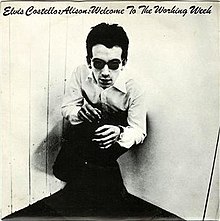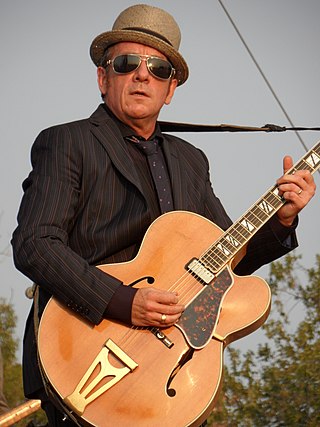
Declan Patrick MacManus, better known by his stage name Elvis Costello, is an English singer, songwriter, record producer, author and television host. According to Rolling Stone, Costello "reinvigorated the literate, lyrical traditions of Bob Dylan and Van Morrison with the raw energy and sass that were principal ethics of punk", noting the "construction of his songs, which set densely layered wordplay in an ever-expanding repertoire of styles." His first album, My Aim Is True (1977), spawned no hit singles, but contains some of Costello's best-known songs, including the ballad "Alison". Costello's next two albums, This Year's Model (1978) and Armed Forces (1979), recorded with his backing band the Attractions, helped define the new wave genre. From late 1977 until early 1980, each of the eight singles he released reached the UK Top 30. His biggest hit single, "Oliver's Army" (1979), sold more than 500,000 copies in Britain. He has had more modest commercial success in the US, but has earned much critical praise. From 1977 until the early 2000s, Costello's albums regularly ranked high on the Village Voice Pazz & Jop critics' poll, with This Year's Model and Imperial Bedroom (1982) voted the best album of their respective years. His biggest US hit single, "Veronica" (1989), reached number 19 on the Billboard Hot 100.
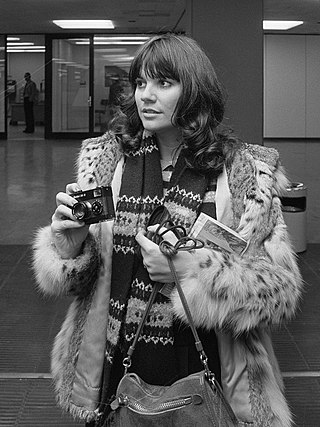
Linda Maria Ronstadt is an American singer who has performed and recorded in diverse genres including rock, country, light opera, the Great American Songbook, and Latin music.

My Aim Is True is the debut studio album by the English singer-songwriter Elvis Costello, originally released in the United Kingdom on 22 July 1977 through Stiff Records. Produced by Stiff artist and musician Nick Lowe, the album was recorded from late 1976 to early 1977 over six four-hour studio sessions at Pathway Studios in Islington, London. The backing band was the California-based country rock act Clover, who were uncredited on the original release due to contractual difficulties. At the time performing as D.P. Costello, Costello changed his name to Elvis after Elvis Presley at the suggestion of the label, and adjusted his image to match the rising punk rock movement.
"Poor Poor Pitiful Me" is a rock song written and first recorded by American musician Warren Zevon in 1976.
"Don't Talk (Put Your Head on My Shoulder)" is a song by American rock band the Beach Boys from their 1966 album Pet Sounds. Written by Brian Wilson and Tony Asher, it is a ballad about nonverbal communication between lovers. Musically, the song is distinguished for its chromaticism, the use of a string sextet, and its key ambiguity. It is among the most harmonically complex songs that Wilson ever composed.

"Heat Wave" is a 1963 song written by the Holland–Dozier–Holland songwriting team. It was first made popular by the Motown vocal group Martha and the Vandellas, who issued it as a single on July 10, 1963, on the Motown subsidiary Gordy label. The single reached number one on the Billboard Hot R&B chart—where it stayed for four weeks—and peaking at number 4 on the Billboard Hot 100.

"You're No Good" is a song written by Clint Ballard Jr., first performed by Dee Dee Warwick for Jubilee Records in 1963 with production by Jerry Leiber and Mike Stoller. It has since been covered by many artists, including charting versions by Betty Everett in 1963, The Swinging Blue Jeans in 1964, and Linda Ronstadt in 1974, whose version was a number 1 hit in the United States.

"Veronica" is a song by Elvis Costello, released in 1989 as the lead single from his album Spike. The song was co-written by Costello with Paul McCartney, was co-produced with T-Bone Burnett and Kevin Killen, and features McCartney on his iconic Höfner bass. In 2004, Entertainment Weekly voted it one of Costello's "10 Greatest Tunes".

"Less than Zero" is the debut single by Elvis Costello, released in 1977 on Stiff Records. It is the eighth track on Costello's debut album, My Aim Is True. Written about British fascist Oswald Mosley, the song features what AllMusic described as a "slow, slinky [and] sinister" melody.
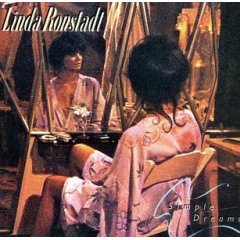
Simple Dreams is the eighth studio album by the American singer Linda Ronstadt, released in 1977 by Asylum Records. It includes several of her best-known songs, including her cover of the Rolling Stones song "Tumbling Dice" and her version of the Roy Orbison song "Blue Bayou", which earned her a Grammy nomination for Record of the Year. The album also contains covers of the Buddy Holly song "It's So Easy!" and the Warren Zevon songs "Poor Poor Pitiful Me" and "Carmelita".

Living in the USA is the ninth studio album by American singer Linda Ronstadt, released in 1978. The album was Ronstadt's third and final No. 1 on the Billboard 200 album chart.
"Almost Blue" is a song recorded by English group Elvis Costello and the Attractions from their sixth studio album, Imperial Bedroom (1982). Written by Costello and produced by Geoff Emerick, the track shares the name of the group's previous 1981 studio album. It was released on 2 July 1982 along with the rest of Imperial Bedroom, and would later be included on side two of The Best of Elvis Costello and the Attractions (1985). A traditional pop song, "Almost Blue" contains lyrics that compare a former relationship to a present one.

Mad Love is the tenth studio album by singer Linda Ronstadt, released in 1980. It debuted at #5 on the Billboard album chart, a record at the time and a first for any female artist, and quickly became her seventh consecutive album to sell over one million copies. It was certified platinum and nominated for a Grammy.
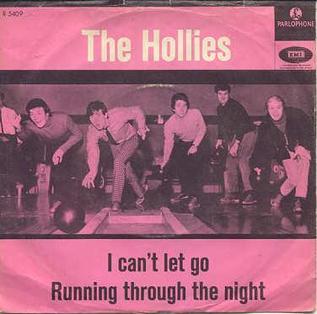
"I Can't Let Go" is a song co-written by Al Gorgoni and Chip Taylor, who also wrote "Wild Thing". "I Can't Let Go" was originally recorded by the blue-eyed soul singer Evie Sands on George Goldner's Blue Cat label, which was popular in New York City in 1965. The song became popular in 1966 for the group the Hollies, who charted at number two in the UK Singles Chart with their version. Linda Ronstadt covered the song in 1980 and had a number 31 hit on the US Billboard Hot 100 chart.

"Watching the Detectives" is a 1977 single by English singer-songwriter Elvis Costello. Inspired by the Clash and Bernard Herrmann, the song features a reggae beat and cynical lyrics.

"Girls Talk" is a new wave song written by Elvis Costello and first recorded by Dave Edmunds in 1978. Costello gave an early version of the song to Edmunds, who reworked the song and released it on his album Repeat When Necessary. Edmunds' version peaked at number four on the UK Singles Chart and number 12 in Ireland, becoming one of Edmunds' most successful career singles.

"High Fidelity" is a song written and performed by new wave musician Elvis Costello on his 1980 album, Get Happy!! Written about an adulterous couple where one member still hopes for reconciliation, "High Fidelity" reflected the personal struggles that Costello had been suffering at the time as a result of increased fame and controversy. Musically, the song was influenced by Motown and was initially performed in a slower style inspired by David Bowie's Station to Station.

"45" is a song by Elvis Costello from his 2002 album When I Was Cruel, written by Costello. The second single released from the album, it reached number 92 in the UK charts. To date, it is his last single to chart in the United Kingdom.
"Welcome to the Working Week" is a song written by and first recorded by Elvis Costello in 1977 for his debut album My Aim Is True. A sardonic comment on the working life aimed at a more privileged woman, the song features a brief runtime and unpolished production. Released as the B-side to "Alison", the song has since attracted critical acclaim from music writers.

Live In Hollywood is a 2019 live album release by Linda Ronstadt. It was recorded at Television Center Studios in Hollywood, California on April 24, 1980, for broadcast as a special on HBO. All tracks from this recording except "Blue Bayou" and "Poor Poor Pitiful Me" are previously unreleased. This is the first live album released by Ronstadt. The master tapes, thought to be lost, were discovered through a chance encounter with a Warner Brothers engineer leading to their recovery.
